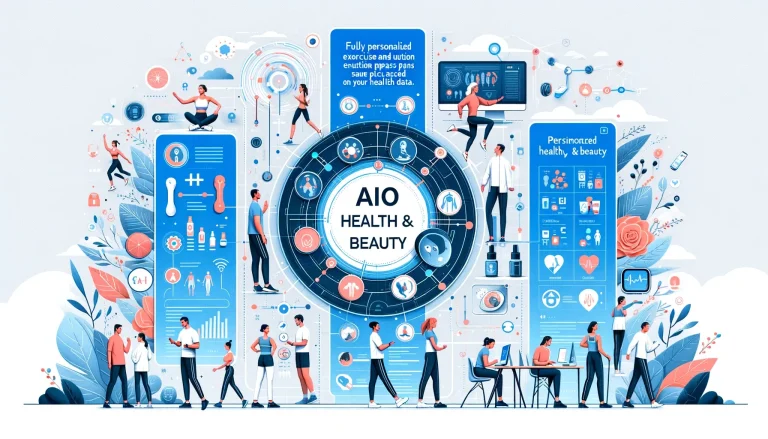In the modern age, the confluence of aiotechnical.com health & beauty industries is not merely an evolution—it’s a revolution. With its ability to sift through and analyze vast datasets rapidly, AI is transforming personal care, wellness, diagnostics, and treatment. This article explores how AI technology is reshaping the landscapes of health and beauty, paving the way for innovations that were once confined to the realms of science fiction. From personalized skincare regimes based on genetic analysis to early detection of diseases through sophisticated algorithms, AI’s impact is profound and far-reaching. As we stand on the brink of this new era, it’s crucial to understand the breadth of AI’s influence and the potential it holds for future advancements in health and beauty.
AI in Health: Diagnostics and Personalized Care
Early Detection and Diagnosis
AI’s capability to analyze medical imagery with precision has introduced a paradigm shift in early detection and diagnosis. Machine learning models, trained on thousands of images, can identify conditions ranging from melanoma to retinal diseases with greater accuracy than ever before. This section will discuss innovations such as IBM Watson’s ability to analyze medical images and Google DeepMind’s breakthroughs in diagnosing eye diseases from retinal scans. These advancements not only promise to make healthcare more accessible but also significantly reduce the time between detection and treatment, saving countless lives.
Personalized Health Care Plans
Beyond diagnostics, AI’s role in creating personalized health care plans is groundbreaking. By analyzing genetic data, lifestyle factors, and ongoing health records, AI systems can tailor health care strategies to individual needs. This personalized approach is particularly impactful in managing chronic conditions such as diabetes, where AI-driven apps can monitor glucose levels and suggest diet and exercise adjustments in real-time. We’ll examine case studies of platforms like Babylon Health, which uses AI to offer personalized health advice, demonstrating the potential of technology to support individual health journeys.
AI in Beauty: Customization and Innovation
Personalized Beauty Solutions
The beauty industry has always been at the forefront of adopting innovative technologies to enhance customer experience. AI has taken this to a new level, offering personalized beauty solutions tailored to individual skin types, conditions, and preferences. This section will explore how companies like Proven Skincare use AI to analyze millions of data points to create personalized skincare routines. Similarly, we’ll delve into how Sephora’s Color IQ system uses AI to match customers with the perfect foundation shade, highlighting the technology’s role in ensuring customer satisfaction and loyalty.
Virtual Try-Ons and Augmented Reality
Virtual try-on technology, powered by AI and augmented reality (AR), has revolutionized the way consumers shop for beauty products. By allowing customers to see how products look on them virtually, these technologies have significantly enhanced the online shopping experience. L’Oréal’s acquisition of ModiFace, a leader in AR beauty tech, exemplifies the industry’s move towards immersive, digital-first beauty experiences. This segment will cover the technological underpinnings of virtual try-ons and discuss their implications for consumer behavior and industry standards.
The Impact of AI on Health and Beauty Research
In the quest for new treatments and products, AI is significantly reducing research and development timelines. This section will cover how AI algorithms can predict the effectiveness of pharmaceutical compounds, expediting the drug discovery process. Examples include Atomwise, which uses AI to find new drug compounds, and its role in speeding up the development of treatments for diseases like Ebola and multiple sclerosis. Similarly, in the beauty sector, AI’s ability to analyze the effectiveness of ingredients has led to innovations in product formulation, reducing reliance on trial and error. We’ll explore how companies like L’Oréal are investing in AI research to create more effective, safer beauty products.
Ethical Considerations and Privacy
As AI becomes increasingly integrated into health and beauty, ethical considerations and privacy concerns come to the forefront. This section will discuss the importance of transparent AI systems, the potential biases in AI algorithms, and the measures needed to protect consumer data. The discussion will extend to the responsibilities of companies in ensuring their AI systems are ethical and respectful of user privacy, drawing on guidelines from organizations like the European Union’s General Data Protection Regulation (GDPR).
Conclusion: The Future of Health and Beauty with AI
The integration of AI into health and beauty is only the beginning. As technology advances, the potential for more personalized, effective, and efficient care solutions grows. This concluding section will look ahead to the future, speculating on how AI might further transform these industries. We’ll consider ongoing advancements in AI, potential ethical and societal impacts, and the importance of maintaining a human-centric approach in technological development. The future of health and beauty with AI is bright, filled with possibilities for enhancing well-being and personal care like never before.


